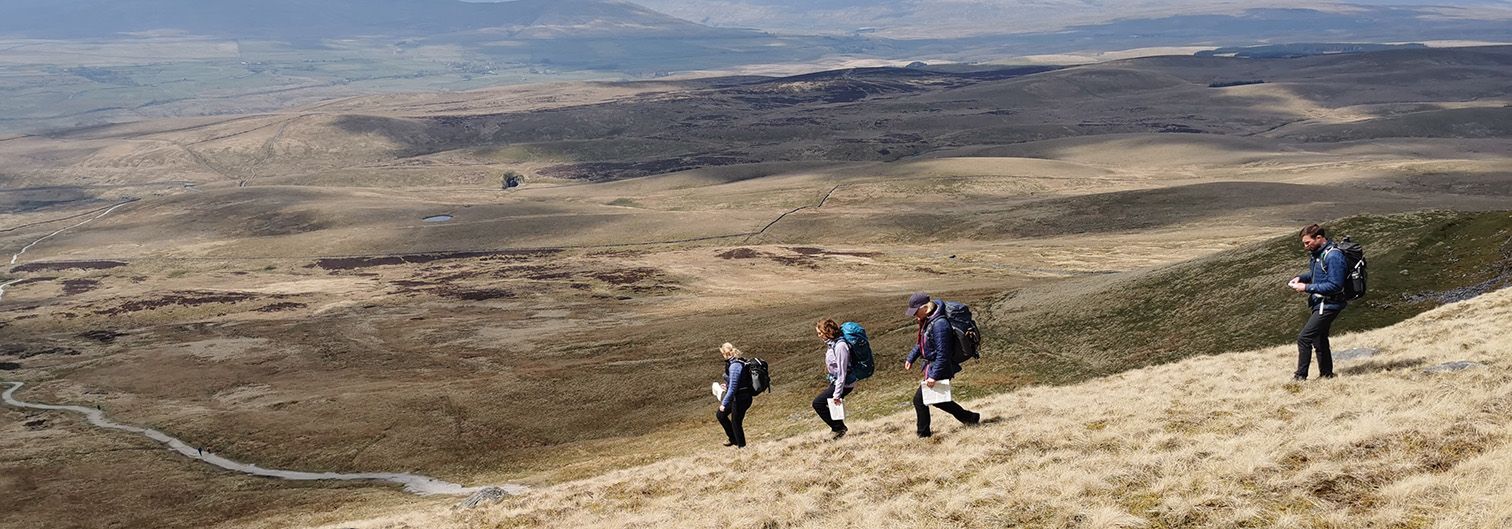
Top Ten Tops for Hill and Moorland Leader trainees
There are lots of posts out there to aid the Mountain Leader trainee in getting ready for assessment (including a few of my own), so I thought it was about time someone wrote something similar for those who are preparing for the Hill and Moorland Leader assessment.
1. Enjoy exploring hills and moors. I know this sounds obvious, but sometimes I hear candidates, upon passing their assessment, say things like, “Phew! Glad that’s over. I never have to log Quality Hill and Moorland Days every again!”. I always think this is a real shame, as enjoying going hillwalking is actually what these awards are all about. I know that as you near assessment it will feel like there is a certain amount of pressure to make every single walk ‘count’ as a Quality Day, but try to just go out and enjoy yourself. Some of those enjoyable days will count as Quality Days, and some won’t. The answer to this is to not put yourself forwards for assessment until you are nearly ready. By that time you should already have the necessary 40 minimum days, and then the time between booking your assessment and the assessment itself can be spent just tidying up any bits and pieces of the syllabus that you think you need to practice more.
2. Share your DLOG. I often have candidates who are approaching assessment ask if they can share their DLOG with me before they actually book. This is a good idea. Obviously it’s polite to ask whoever you’re going to share your DLOG with if they mind doing that, and you’ll need to make sure your DLOG is bang up to date before you share, but if you choose the right person (I’d recommend an assessor of the Hill and Moorland Leader) they’ll be able to give you some valuable feedback before you book (hopefully) with them. Bear in mind though that when I do this for candidates, the feedback I’m giving them isn’t about whether I think they will Pass their assessment. It’s just an appraisal of their DLOG, and whether I think they have enough days in there to book the assessment.
3. Go hillwalking with less experienced people. This will give you the best opportunities to practice everything that’s in the syllabus. You’ll have to plan the day, give each person a kit list, navigate, look after people throughout the day, teach them something about the environment, and refine your leadership and group management skills. None of this is possible when you’re only going out walking with peers, friends from your regional MTA group, or assisting those who are already qualified.
4. Go hillwalking with peers. See what I did there? Yes, joining your regional MTA group and getting out to practice with other trainees is incredibly valuable. These days may or may not ‘count’ as Quality Hill and Moorland Days, but you’ll have an opportunity to bounce ideas off other trainees, share good practice, and make mistakes with others there to help.
5. Go hillwalking with more experience people. Yes, you’ve guessed it. Hillwalking with more experience folk is also really valuable. These days almost certainly won’t ‘count’ as Quality Hill and Moorland Days, but what better way to gain experience of leading groups than under the guidance of an experienced leader.

6. Go hillwalking on your own. So, are you getting the idea now? Five out the Top six tips involve going hillwalking! Isn’t that great! Solo walks are a superb way for you to gain in confidence, practice skills, and go to areas that you haven’t been to before.
7. Go hillwalking in areas you don’t know. There are so many great hill and moorland areas in the UK that you can explore. I know on my own HML training courses candidates who live in, say, Northumberland, always look startled when I suggest they should go explore the Shropshire Hills, or Exmoor in their consolidation period. Likewise, those candidates from the South West cringe when I tell them their DLOG would look a lot better if they had some days in it from the Cheviots, North York Moors, or the Pentland Hills. Hillwalking is amazing, isn’t it? Going to new areas and discovering what there is to do there should be a big part of your journey towards becoming qualified.
8. Be happy with your kit. Get to know your own clothing and equipment inside out. Know where your torch can always be found in your rucksack. Know how to use all of the common maps types for navigation. Be informed about what waterproof jackets and trousers work best for you. Most of all, be ready to give advice to others so that they can join you on your walks.
9. Go on Mountain Training Association workshops. Yes, you should join the Mountain Training Association. This will give you access to regional groups and peer-led workshops, but also a whole range of workshops organised by approved and qualified providers. They range from leadership, group management, environment, and navigation workshops, and they take place all around the country. You do need to be an MTA member to access them though. Other membership benefits are that you can access some amazing gear deals, take part in some valuable online learning modules, and once you’re qualified, also gain from a really good insurance package.
10. When the time comes, go into your assessment knowing that everyone there wants you to Pass. The best possible result from any Mountain Training assessment is that every single candidate goes away with a Pass. It’s pretty awesome when that happens. And it does happen quite a lot. Your assessor is on your side. Yes, they do have to make sure that every candidate is at the standard required, and deferrals and fails do happen, but your assessor is not hoping for opportunities to give these results. Remember, that urban myth that we hear about that all assessments must have a certain number of Passes, Deferrals, and Fails is just that. A myth. There are no ratios for results. We want everyone to Pass, and a lot of the time we all get that as a result. Brilliant! This also means that you are not in competition with the other candidates. Be friendly. Play nice! You can all go away after the assessment as a fully qualified Hill and Moorland Leader!
For more details of the Hill and Moorland Leader courses we offer, click here





